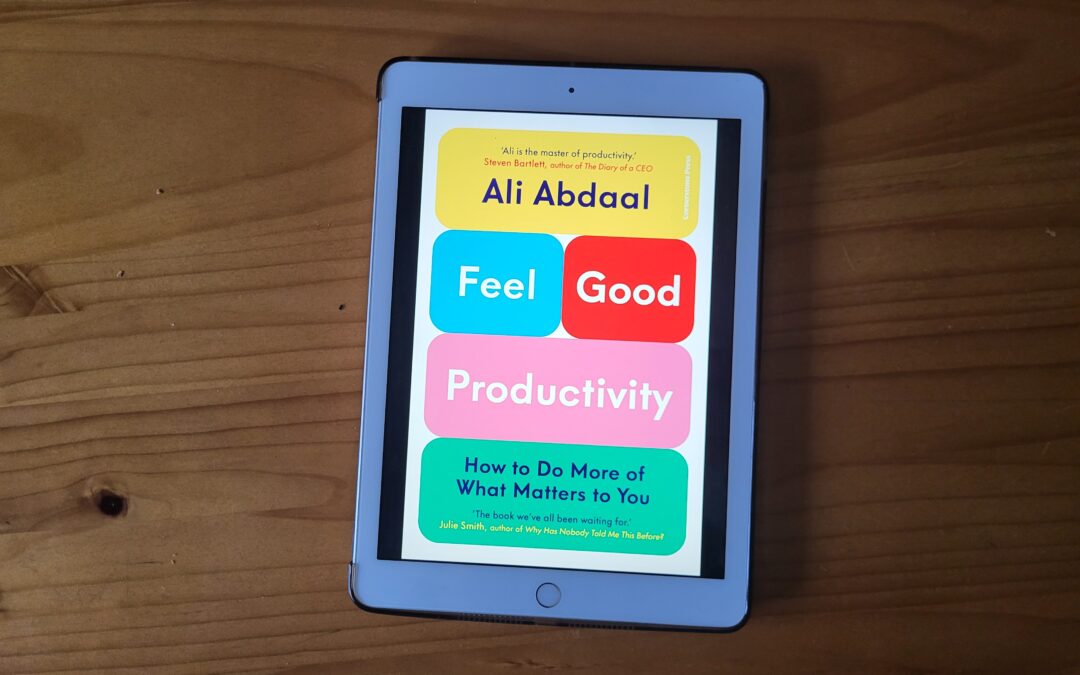From the moment I opened Feel Good Productivity by Ali Abdaal, I was captivated. The “no pain, no gain” mentality never worked for me, and I was looking forward to reading about a different way to achieve goals and better my life.
As a personal and professional coach and consultant, I always seek new approaches and tools that can work for different clients.
In this sense, Feel Good Productivity has a lot to offer. It comes not only with ideas but suggestions on how to apply them. I finished the book having learned some and with great techniques to try and test.
But be aware: it doesn’t mean that hard work will be gone from your life after reading it. Or that you can stay there, comfortable in your comfort zone, and things will happen. Feel Good Productivity is about getting your mind to perceive hard work as good for you and welcome it.
Why I bought Feel Good Productivity by Ali Abdaal
I’ve been watching Ali Abdaal’s YouTube videos for many years. His productivity tips and insights are helpful, practical, affordable. I truly appreciate his no-nonsense approach.
But I’ve never bought his courses or used his affiliate links. Not that they weren’t valuable; they were just not for me or my business. So, when I heard about his book, I decided to purchase it for no reason other than to support the author after so many years of unpaid consultation.
First impressions
I pre-ordered and read the e-book version of Feel Good Productivity. The length of the book (304 pages) and pricing (€10) felt just right. And the organisation and distribution of the chapters made the topics easy to digest, following all best practices I would hope to find while beta reading non-fiction books.
The book begins by telling us about a crucial moment in the author’s life, a personal touch that immediately drew me in and set the tone for the rest of the book. Ali Abdaal talks from first-hand experience and is ready to share his failures as much as his successes.
As I delved into the content, I was impressed by the depth of research that went into creating it. Ali Abdaal’s medical background is evident in his arguments, which are based on studies in many academic journals. Other similar books are based only on personal and professional insights, which isn’t bad per se. But, in my eyes, this scientific approach added credibility to his suggestions and ideas.
Main takeaways
I finished Feel Good Productivity with many takeaways and things to think about. Without spoiling it, here are some of them:
- Approaching tasks with a sense of curiosity and playfulness
- Reducing the stakes of your tasks
- Harnessing your curiosity
- Keeping a beginner’s mindset
- Owning the process if you can’t own the results
- Viewing procrastination as a type of fear to be noticed/seen
- Being proud of the things you haven’t done (not only what you have done)
Another important highlight is that you will get instructions on inviting these changes to your life. The suggested actions are hands-on, simple but effective routines and exercises that will help you to get started.
As I’ve just finished reading the book, I have yet to test and apply his ideas. But I can already see how they are playing in the back of my head. For instance, I am working on simplifying some of my workbooks, approaching them as if I had started using them today.
It’s so easy to overthink and complicate the process while trying to refine and perfect it. But Ali Abdaal’s book reminds us that we are drawn to things that make us feel better about ourselves. We will actively avoid anything that feels difficult and overwhelming.
I know it sounds like common sense. But I am sure you have often found yourself overanalysing and adding steps to an otherwise straightforward journey. I’ve certainly done it myself. Reviewing my process and thinking about how they can be slimmed down has been interesting.
I was also pleased to see in the book a section about energy investment portfolio. Personal energy management is something I’ve been working on, and noticing it mentioned in the book validated my efforts.
What I missed
However, not everything resonated with me. For instance, the suggestion of using people as an energiser didn’t quite hit the mark. As an introvert, being around people can often drain rather than energise me.
I hoped the book suggested an alternative for people like me. But then again, the author talks from his own experience, not mine. And it’s not that I don’t see the value of teamwork and so. But because people are one of the pillars of Feel Good Productivity, I was left wanting a substitute or specific path to follow.
While many of the ideas can be found elsewhere, especially in the bestseller Atomic Habits by James Clear, it doesn’t diminish the value of the book. In fact, having all these ideas compiled in one place and packed differently adds to its appeal.
The only thing I truly felt was missing was some sort of roadmap. The book presents a lot of ideas to test and try, but without a structured journey to follow, it can feel a bit overwhelming. I am just going to wait and hope for a workbook coming in the future.
Do I recommend Feel Good Productivity by Ali Abdaal?
I highly recommend Feel Good Productivity by Ali Abdaal to anyone hoping to become more productive without having to focus on pain and suffering. If you’re looking for a different perspective, give it a try. You won’t be disappointed.
And you don’t need to know anything about productivity to make the most of this book. You also don’t need to be a YouTuber or content creator. The ideas and suggestions can be applied to any business or your personal life.


